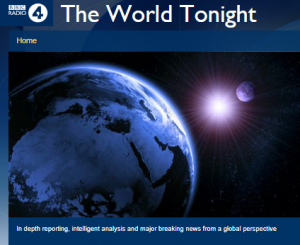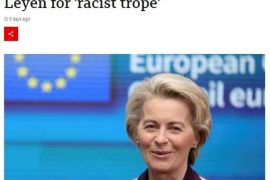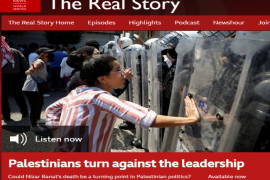Previously we discussed a September 7th written report by the BBC Jerusalem bureau’s Yolande Knell in which the editorial guidelines requirement to inform audiences of contributors’ affiliations was ignored:
BBC AGAIN FLOUTS EDITORIAL GUIDELINES IN INTERVIEW WITH ‘ACTIVIST’
On the same day audio versions of that report from Knell were aired on three different BBC radio programmes:
‘Newsday’, BBC World Service radio, from 17:40 here
‘Newshour’, BBC World Service radio, from 48:57 here
“The World Tonight’, BBC Radio 4, from 28:32 here
The audio report followed more or less the same format as Knell’s written article and included the same contributors.
Knell: “Across Ramallah Ubay al-Aboudi is happy to be home with his wife and three sons. He was arrested last month and jailed on his way to a protest. He was freed after foreign diplomats voiced concern but still faces charges. The Palestinian Authority is backed by Israel and many Western countries. It relies heavily on its donors which have helped train and equip its security forces. Mr al Aboudi is unconvinced by politicians’ promises of reform.”
Al-Aboudi: “I’m not ashamed that I am a critic of the PA. They have failed politically, they have failed economically. We are sliding more and more inside into a dictatorship. I think that all European countries should review their support for the security apparatus with the PA and know that they are supporting a great human rights violation.”
While the BBC was happy to provide amplification for Uday al-Aboudi’s assertion that European funding for Palestinian Authority security forces is “supporting a great human rights violation” in three separate programmes aired on two different radio stations, listeners were not able to put his comments into their appropriate context.
Unlike the written article, the audio reports did not provide any information concerning Ubay al-Aboudi’s role as “director of the Bisan Center for Research and Development”. Once again BBC audiences were not informed that in his Linkedin profile al-Aboudi describes himself as also working for an NGO called UAWC which has links to the PFLP terrorist group. Neither were listeners told that al-Aboudi has himself been arrested at least three times due to his PFLP activities.
Neither did the BBC bother to inform audiences that the PFLP-linked NGOs with which al-Aboudi is associated have themselves received funding from the EU and from individual European countries or that the human rights record of some of the employees of those NGOs is no less newsworthy than that of the PA security forces.
“Ubai Aboudi, Bisan’s Executive Director: In June 2020, Aboudi was sentenced to 12-months in prison. . In an indictment of another PFLP leader, Aboudi is mentioned as a PFLP member who was told to recruit more members to the cell.
Iteraf Hajaj (Rimawi): Served as Bisan’s Executive Director in 2017 while the NGO was receiving funding from the EU. He was arrested on September, 23, 2019 by Israeli forces. A statement from the General Security Service (Shabak) refers to Rimawi as being responsible for PFLP clandestine operations.”
“In 2019, two senior financial employees of UAWC were arrested and are currently standing trial for being part of a PFLP terror cell responsible for the August 2019 murder of 17-year old Rena Shnerb.
Samer Arbid, UAWC accountant and previously UAWC “financial officer”: Samer Arbid is on trial for commanding a PFLP terror cell that carried out a bombing, murdering Shnerb, and injuring her father and brother. According to the indictment against him, Arbid prepared and detonated the explosive device.
Abdel Razeq Farraj, UAWC “Finance and Administration Director”: According to his indictment, Razeq Farraj held a senior PFLP post and authorized the August 23, 2019 bombing. He is currently standing trial.”
Since the death of Nizar Banat in June various BBC platforms have produced content (see ‘related articles’ below) showcasing critics of the Palestinian Authority. Five reports have featured Ubay al Aboudi without any mention of his own PFLP links or those of the NGOs employing him. One item featured two contributors linked to al Shabaka without that fact – and the organisation’s political agenda – being made clear to audiences.
BBC coverage of internal Palestinian affairs has long been patchy and unenthusiastic to say the least and so audiences have little existing knowledge on that subject. It is clearly then all the more egregious just to present an interviewee as a “critic” of the PA or a “human rights activist” without any clarification of that contributor’s own “affiliations, funding and particular viewpoints”.
The BBC’s own editorial guidelines acknowledge that “[w]e should not automatically assume that contributors from other organisations (such as academics, journalists, researchers and representatives of charities and think-tanks) are unbiased”. It is therefore essential that in reports about opposition to the Palestinian Authority, audiences are also informed of the broader political agenda – and certainly of any links to terrorist groups – of the people the BBC blandly presents as that body’s “critics”.
Related Articles:
WHO IS BBC WORLD SERVICE RADIO’S ‘HUMAN RIGHTS ACTIVIST’?
BBC WS MAINSTREAMS UNCHALLENGED ANTI-ISRAEL SMEARS AS ‘THE REAL STORY’
BBC AGAIN FLOUTS EDITORIAL GUIDELINES IN INTERVIEW WITH ‘ACTIVIST’






The BBC’s one-sided reporting of events in Israel and Gaza sadly is going to get worse. Now that the left-wing fanatic, Jess Bramar, has been appointed Executive News Editor of BBC World News, expect even more omissions and anti-Semitic bending of the truth from this despicable media.